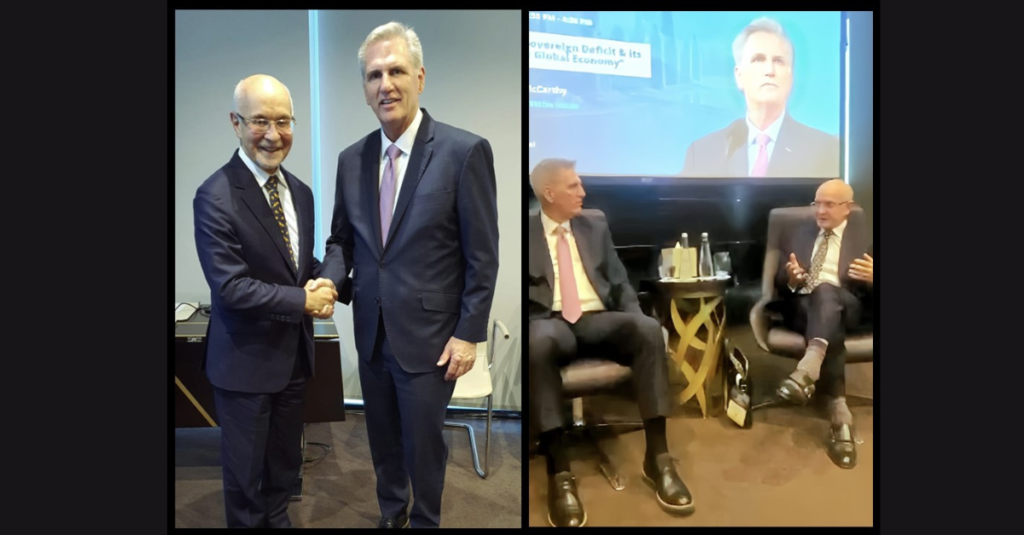
The Growing Concerns Over the Global Sovereign Debt Crisis
The AIM Summit Dubai has once again provided a crucial platform for discussing major economic and financial challenges. Among the standout discussions was the Kevin McCarthy sovereign debt discussion, where the 55th Speaker of the US House of Representatives, Kevin McCarthy, and David Gibson-Moore delved into the complexities of global sovereign debt, financial volatility, and political polarization in Western democracies.
As global economies grapple with rising debt levels, economic volatility in emerging markets, and increasing political uncertainty, understanding these dynamics is crucial for investors, policymakers, and business leaders.
Global Sovereign Debt Crisis: A Growing Concern
The global sovereign debt crisis is an urgent issue affecting both developed and developing nations. Governments worldwide are struggling with:
- Rising National Debts – Many economies are accumulating debt at an unsustainable rate.
- Inflation and Interest Rate Hikes – Central banks have been increasing interest rates to combat inflation, making debt repayment more difficult.
- Market Uncertainty – High levels of government borrowing lead to instability in financial markets.
At the AIM Summit Dubai, Kevin McCarthy and David Gibson-Moore explored how governments can develop better policies to manage sovereign debt and ensure long-term financial stability.
Political Polarization in Western Democracies and Economic Instability
One of the most critical challenges facing Western democracies today is political polarization. The growing divide between political parties has serious economic consequences, including:
- Policy Deadlocks – Governments struggle to implement effective economic policies.
- Loss of Investor Confidence – Businesses hesitate to invest in politically unstable regions.
- Weakened Democratic Institutions – Disruptions in governance impact economic planning.
During the discussion, McCarthy and Gibson-Moore stressed the need for political unity to drive economic progress and financial stability.
Challenges of Economic Volatility in Emerging Markets
Emerging markets are facing significant financial stress due to external economic conditions. The challenges of economic volatility in emerging markets include:
- High Inflation Rates – The cost of goods and services is rising rapidly.
- Weakening Currencies – Exchange rate fluctuations make trade difficult.
- Debt Burdens – Many emerging economies struggle with repayment of international loans.
However, emerging market trends at AIM Summit Dubai also highlighted opportunities, including technological advancements, foreign investments, and infrastructure development.
The Global Economy and Financial Volatility
Economic uncertainty is no longer limited to emerging markets. Even established economies like the United States and Europe are facing financial volatility due to:
- Stock Market Fluctuations – Unpredictable market movements impact global trade.
- Geopolitical Tensions – Conflicts and trade wars disrupt supply chains.
- Banking System Instability – Financial institutions are under increased pressure.
At AIM Summit Dubai, McCarthy emphasized the need for proactive policies to manage economic risk and prevent future crises.
The US Agricultural Sector and Urban Expansion as Economic Pillars
Amidst economic uncertainty, Kevin McCarthy and David Gibson-Moore pointed out areas of resilience within the US economy. The US agricultural sector and urban expansion provide significant economic growth potential:
- Expanding Agricultural Exports – The US remains a leading global food supplier.
- Innovations in Farming Technology – Agri-tech advancements increase productivity.
- Urban Growth and Infrastructure – New housing developments fuel economic expansion.
By leveraging these strengths, the US can counteract economic downturns and enhance long-term stability.
The EM-ification of the US Economy: A Troubling Trend?
A key topic discussed was the “EM-ification” of the US economy—a term referring to how the US is showing characteristics of an emerging market, such as:
- Political Uncertainty – Government instability impacts economic policies.
- Weakened Institutions – Erosion of financial and political institutions.
- Increased Volatility – Rapid fluctuations in financial markets.
At AIM Summit Dubai, experts warned that unless steps are taken to address these issues, the US could face long-term economic instability.
The Need for Cross-Party Collaboration Initiatives
One of the strongest takeaways from the discussion was the importance of cross-party collaboration initiatives. Kevin McCarthy emphasized that political unity is essential for tackling economic challenges. Steps that can improve collaboration include:
- Bipartisan Efforts on Debt Reduction Policies
- Strengthening Governance and Public Institutions
- Encouraging Private-Public Partnerships for Economic Growth
Final Thoughts
The AIM Summit Dubai provided a platform for crucial discussions on the global sovereign debt crisis, financial volatility, and political polarization in Western democracies. Kevin McCarthy and David Gibson-Moore offered valuable insights into these pressing issues, highlighting both the risks and opportunities facing the global economy.
As economies worldwide navigate these turbulent times, strong leadership, sound financial policies, and cross-party collaboration will be key to ensuring long-term economic stability.
For more insights from the discussion, check out this LinkedIn Post.